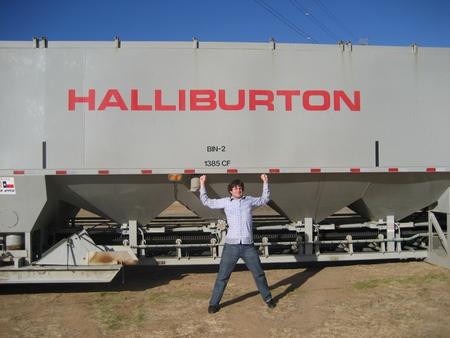There’s been a lot of buzz surrounding the Arizona state government’s latest anti-immigration ploy—to build its own border wall on private land, with money from private donors, using inmate labor. On the official website, unveiled on July 20, Arizona state senator Steven Smith explains that this initiative came about because “the consequences of this lack of security have yielded an unparalleled invasion of drug cartels, violent gangs, an estimated 20 million illegal aliens, and even terrorists.”
Meanwhile, during that same week, the office of Arizona Democrat Gabrielle Giffords announced that the Department of Homeland Security (DHS) had awarded former Halliburton subsidiary KBR (Kellogg, Brown & Root) a $24.4 million contract for “upkeep” of border infrastructure. The self-proclaimed “largest contractor for the U.S. army” will be providing maintenance for the fences and gates, roads and bridges, and lights and electrical systems, among other things. This isn't the first time that KBR has been involved with immigration enforcement.
Compared to the KBR contract, the Arizona state wall-building initiative does not mean much. Not because the Arizona state government doesn’t deserve close scrutiny, because it does. Nor is the KBR story more important because of the size of this particular contract, which is relatively small. It is more important because it represents the increasing fusion between the government and private sector in border enforcement, an emerging corporate-state nexus, one that is both obscured by, and a result of, the type of heated anti-immigrant rhetoric found in Arizona. And though Republicans and Democrats might go about things differently, this nexus, and this idea of fence-building, comes from both sides of the political divide.
The media is missing the real bipartisan tale of two walls: The immigration debate is profitable. On one hand there are the Republicans with the “invasions” and “terror” coming over the border. On the other are the Democrats offering their “practical solutions.” One involves a state government singlehandedly building a wall “against all odds,” and against the federal government for that matter, with the donations of the “good” (and mainly white) people who support the initiative. The other involves a governmental institution with a big budget doling out cash to a large controversial company right out of Dick Cheney’s lair.

In fact, KBR prowling around the U.S.-Mexico borderlands should raise journalistic red flags given the company’s history of hanging around, and profiting from, war zones (most notably Iraq). Instead Pia Carusone, Giffords chief of staff, “applauded the contract, noting that it’s essential that border infrastructure be properly and fully maintained,” according to the Arizona Daily Star.
If only that were all that it meant. For both political parties, the answer and underlying assumption is that we need to secure our boundary at all costs. Both are all about walls.
Arizona will have little success at best building its fence. As they collect $5 donations, it will take a lot of cash to get even a mile's worth of wall constructed, since the cost ranges from $3 to $7 million per mile. Where the state is having success again is with the media, as it has since early 2010 when the country became aware of its alarming anti-immigrant laws.
The thing is, even if at worst Arizona is portrayed as the laughing-stock of the country, it is still getting its political message out to the public at large, and to the federal government. And the federal government almost always responds, even as it publically dismisses one of the state’s law or initiatives. This is the nature of the “comprehensive immigration debate” in the United States these days with the political parties, a nowhere track leading to only more securitization.
In 2010, even though Obama chastised Arizona’s most flagrant and famous anti-immigrant bill, SB 1070, a mere two weeks after its implementation, his administration approved an additional $600 million for border security in August. He said:
I have made securing our Southwest border a top priority since I came to office. That is why my administration has dedicated unprecedented resources and personnel to combating transnational criminal organizations that traffic in drugs, weapons, and money, and smuggle people across the border with Mexico.
When Obama used the term "unprecedented," he wasn’t lying. And there is more on the way, if we are to believe the Southwest Border Counternarcotics Strategy the administration unveiled in July. A strategy that treats the southwest border as a virtual war zone can only be good news for the military contractors.
This story is the big story. It is much larger and much more important than Arizona’s foolish and racist attempt to build its own border wall. The combination of Republican alarmist rhetoric and Democrat pragmatic border securitization is the perfect profit recipe for KBR and many other companies jumping on the border bonanza. Alarmist rhetoric along with “unprecedented resources” can only mean fat contracts, not only for KBR, but other businesses, in what appears to be an emerging sure-fire border-enforcement business.
Did you find this useful? Donate to NACLA

